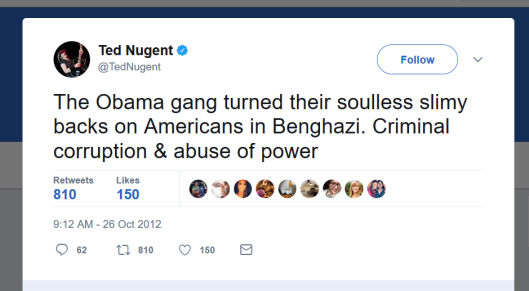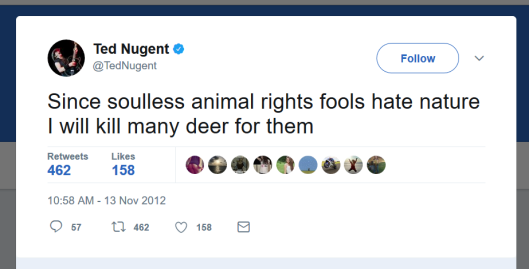Tags
Climate Change, Cthulhu, Donald Trump, Environmentalism, global warming, H.P. Lovecraft, Horror, Koch Brothers, Madness
What could be more evil than working to end all life as we know it? It’s a tough question for me, because I’m not in the habit of using the term ‘evil’ in direct reference to anything that happens in the real world. Mostly, I think of that reluctance as healthy restraint, but perhaps restraint isn’t always that healthy after all. Skepticism sometimes acts as the hand servant to kind of inertia. No need to think or do anything drastic. Let’s wait for the evidence! You can keep saying that until it’s too late. All of which brings me back to the notion of evil, because normal human cognitive bias is one thing and a focused political agenda is quite another. Uncertainty is one thing. When such an agenda imperils life as we know it, it would be a mistake to think of that as just another opinion. It would be a mistake to think of it as anything less than a threat, or to think of that threat in moderate terms.
Don’t get me wrong. Global warming is not the fault of denialists. We in the industrialized world are all contributing to global warming, but some folks are working damned hard to make sure we keep right on doing it, to keep questions about global warming and an effective response off the table, and toprevent all of us from addressing our collective responsibility as we ought to.
We are not supposed to demonize folks we disagree with, right? But there are times when the actual context of real world events finds its parallels in mythology and fiction. I can’t help thinking the issue of global warming has presented us one of those times.
Global warming sounds a lot like the Great Old One sleeping deep in the South Pacific. It’s hard to believe that such a threat could exist, hard to grasp the full significance of the prospect. It’s much more easy to dismiss it as yet another myth, a false god worshiped by fools and primitive peoples. If taken seriously, on the other hand, the thought is maddening. Like Cthulhu waiting in the deep, global warming threatens to devour everything we do and everything we care about. How does one grasp that and then go on about his life? How do you build a bridge knowing it will one day rest unused under a harsh sun? How do you write a book, conscious of the day there will be no-one left to read it? How does anyone look at a child knowing what’s coming without feeling a terrible urge to tears?
What to do about this threat? That’s a damned hard question. For myself, I couldn’t count the number of changes that must happen to combat the coming terror. I couldn’t even count the number of plastics in the room around me, starting with the computer keys I am tapping away at to write this blog post. I certainly couldn’t imagine my travels or my place of residence in the wake of the changes necessary to halt global warming. How would I eat? How would food find its way to me, let alone the millions living in the cities? It’s all way too much. The change is simply not possible!
If the world as we know it must change immediately (more like yesterday) in order to save the world as we know it… well that is a maddening thought indeed! It’s more than a little like saying the end of the world is a virtual certainty.
…and Cthulhu lies waiting beneath the waves.
As maddening as the prospect of doing something about climate change is for me, I think it must be all that much more difficult for those whose world view is entirely defined by the free market. Global warming is not merely a challenge to our future. It is a challenge to our present and repudiation of our past. Global warming refutes the cost/benefit analysis of every single transaction carried out since the fossil fuel revolution. (They all have externalities not yet settled.) It denies the value of progress. It turns the angels of manifest destiny into the harbingers of doom, a prospect once real only to those unfortunate enough to stand in the way of that destiny. Global warming changes everything. It transforms the meaning if history even as it demands a new social order. If we are to ever have a future, that future will not be reckoned as we have reckoned the past. For those deeply committed to a world as a function of supply and demand, it is not merely a daunting call for change; it’s a claim that their own world is an illusion. Faced with such a prospect, I can well understand why some people might think it better to deny the whole thing.
…but toward what end?
If Cthulhu is really sleeping there in the ocean, it won’t help much to pretend he is merely plankton. So what is the end game for climate change denial? You cannot build a better world on the present world order. You cannot even maintain this one. That is the terrible prospect which confronts us all. So, what will actually be accomplished by the billions of dollars poured into the effort to confound the issue and keep serious discussions of climate change off the table? What is to be gained by dismissing the whole thing as a Chinese conspiracy.
The thought that keeps creeping into my skull is this. We won’t experience climate change as a natural disaster. Hell, we aren’t experiencing it that way now. By ‘we’ I mean those of us in the developed world. Sure there are farmers whose crops no longer grow in certain places, and there are people whose homes are washing away, but these are lives lived on the margins of the modern global order, and for most of humanity these are stories about far away people and places. The narratives taking shape in modern media (even those reflecting a ‘liberal’ view on the subject) will reflect global warming in countless subtle forms. It will take the form of stories about rising prices, changes in consumer behavior, shifts in population, perhaps even a wave of refugees here and there. …and of course there will be political disputes over the consequences of all of this.
This is all broad sketches, I know, but my point is that most of us will experience climate change as social upheaval. There will always be a person or a policy between us and the natural phenomenon driving our new hardships. We will always be able to respond to climate change as though it were this or that bastard making our lives more difficult. We may never get a moment where Cthulhu shows his ugly face. It will always be possible to see his terror in the form of someone acting in a way we probably don’t like, maybe even one we are willing to fight about.
…all of which falls well short of dealing with the real issues.
So again, what is the end-game for denialists? I’m not talking about the every day Joe or Jane who isn’t convinced. I am talking about those financing the maze of think tanks and professional pundits, those who long ago transformed climate change from a scientific question to a partizan politics. I am talking about a President who won’t say whether or not he believes in global warming but tells us by his very actions that he does not. For these people, I suspect the payoff is very much what they get out of all their other political activities; it’s a chance to maintain their own status at the top of the current social order. In the context of climate change, this can mean little more than a chance to keep their privilege as long as possible while the rest of society unravels. There is no riding this disaster out of course, but the progeny of the wealthy may well feel its results long after others have died of it.
I keep writing this as though I am talking about future events, but of course the process has already begun. It will get worse, to be sure, hence the relevance of the future tense. But some are already feeling the effects even as others pretend there is no new disaster under the sun. In any event, I can’t help thinking the real benefit to the financiers of climate change denial will be little other than the hope that their children will be among the last to suffer the full effects of climate change.
This too is a Lovecraftian theme.
In effect, the financiers of climate change denial are hoping Cthulhu will eat them last.

(P.S. Thanks to Milady DeBennet for producing the meme for me.)







 When I go back in August, Moni plans to go with me. In the meantime, she has been visiting old friends and taking me to some of her favorite places. In part, Moni is introducing me to all the people in her life and in part she is telling her friends and family ‘goodbye’. We didn’t get to everyone (dammit!), but I’ve met enough of Moni’s people, and spent enough time with them that for the first time I have a sense of what this move means to her. In the last month I have eaten dinner with Moni’s family, partied with some of her high school friends, traveled a bit with others, eaten at their favorite restaurants, and listened to a good deal of their favorite music. I’m starting to get a sense of the world Moni will be leaving to go up to that icebox I call home. I now have a sense of what she will be missing, and the thought of taking her away from it, away from all these people, is a bit daunting. She wants to go, so she is excited, but she is also leaving a lot of people behind, and so she is also sad. A few paragraphs back, I looked up to find Moni crying. So now I feel bad too. I’m excited to have her coming with me, but I’m also nervous. This is her home, and I am taking her from it. It’s not a bad thing, but it’s not something to be taken lightly.
When I go back in August, Moni plans to go with me. In the meantime, she has been visiting old friends and taking me to some of her favorite places. In part, Moni is introducing me to all the people in her life and in part she is telling her friends and family ‘goodbye’. We didn’t get to everyone (dammit!), but I’ve met enough of Moni’s people, and spent enough time with them that for the first time I have a sense of what this move means to her. In the last month I have eaten dinner with Moni’s family, partied with some of her high school friends, traveled a bit with others, eaten at their favorite restaurants, and listened to a good deal of their favorite music. I’m starting to get a sense of the world Moni will be leaving to go up to that icebox I call home. I now have a sense of what she will be missing, and the thought of taking her away from it, away from all these people, is a bit daunting. She wants to go, so she is excited, but she is also leaving a lot of people behind, and so she is also sad. A few paragraphs back, I looked up to find Moni crying. So now I feel bad too. I’m excited to have her coming with me, but I’m also nervous. This is her home, and I am taking her from it. It’s not a bad thing, but it’s not something to be taken lightly.


































